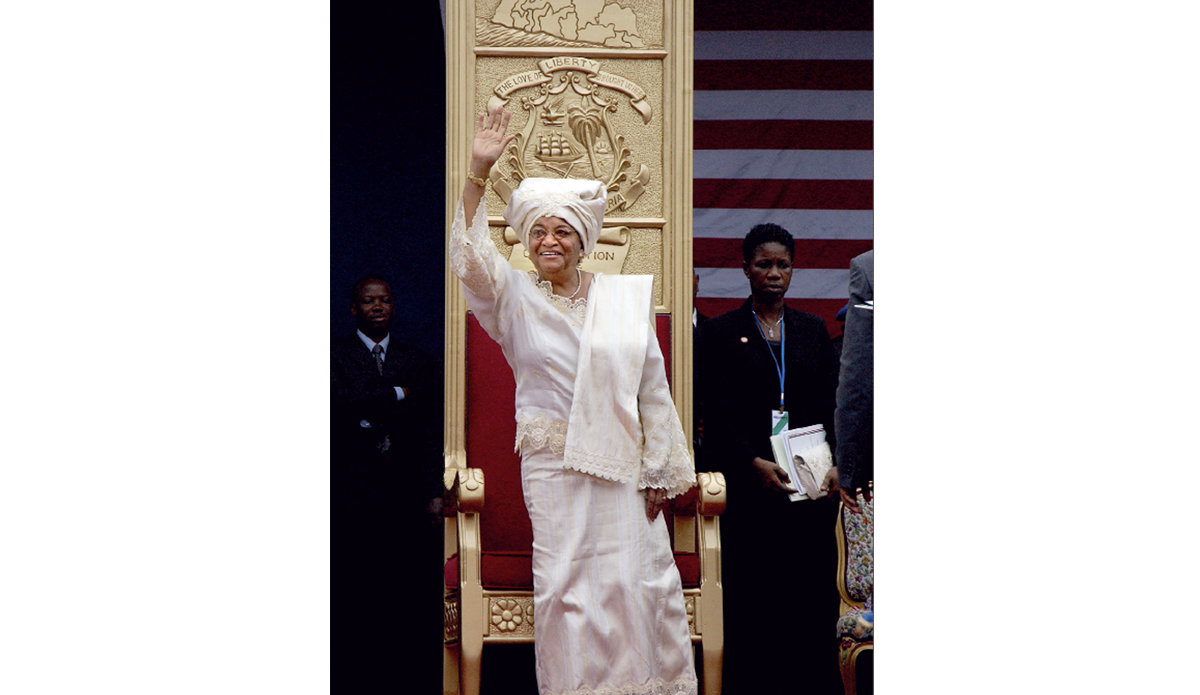EJS and UNMIL | Her Excellency Madam Ellen Johnson Sirleaf, President of the Republic of Liberia (2005-2018)
 President Ellen Johnson Sirleaf’s two terms in office were encapsulated within the lifespan of the United Nations Mission in Liberia’s (UNMIL), which was deployed from 2003 to early 2018. Her legacy will thus be inextricably linked to that of UNMIL and more broadly the United Nations.
President Ellen Johnson Sirleaf’s two terms in office were encapsulated within the lifespan of the United Nations Mission in Liberia’s (UNMIL), which was deployed from 2003 to early 2018. Her legacy will thus be inextricably linked to that of UNMIL and more broadly the United Nations.
Her challenges were nothing short of daunting: to lead a country exhausted from three decades of civil strife, with destroyed infrastructure, a collapsed economy, a non-existent security sector, and state institutions incapable of providing basic services to its people. More importantly, she inherited a country the social fabric of which was shattered by historical injustices and the many atrocities committed during the conflict.
In short, she was burdened with the task of building a nation from scratch. Her many accomplishments must be measured against this hapless background. She introduced her vision for the country in her Agenda for Transformation and Vision 2030, which aimed at strengthening the foundations of peace and stability through justice and reconciliation nd spurring economic growth. In that context, President Sirleaf initiated a number of critical legislative and structural reforms, and successfully persuaded bilateral lenders and multilateral financial institutions to write off nearly US$5 billion in debt accumulated over decades. She embarked on improving the performance of macro-economy, which showed an impressive growth of eight per cent by the beginning of her second term; she heavily invested in addressing the many deficiencies of the health and education sector, building new infrastructure and improving what existed. Under her leadership remarkable progress was achieved in promoting and protecting human rights and free speech.
Regrettably, however, the country’s upward trajectory was severely undermined by the impact of the global economic crisis, followed by a steep fall in the prices of Liberia’s traditional export commodities, such as iron ore, rubber and palm oil. Operations and production in most of the concessions contracted and thousands of workers were laid off. Liberia’s economic development ground to a virtual halt in 2014, when the Ebola virus outbreak hit Liberia harder than any other affected country in West Africa, claiming nearly 5,000 lives and effectively locking down the country.
Despite the significant progress during President Sirleaf’s tenure, many challenges still threaten Liberia’s fragile stability: over half the population of the population lives in poverty and are still waiting to see their share of the peace dividend. Liberia ranks near the bottom on almost all major social and economic indicators, including education, health and employment, as well as on such major international indexes as corruption or ease of doing business. Little progress has been made on national reconciliation and the constitutional review process, which will have to be taken on by the new government.
Similarly, several key laws, such as the Land Rights and Local Governance bills, have yet to be enacted. Finally, the fight against corruption, which President Sirleaf early on declared as “public enemy No 1”, fell short of expectations: the Liberia Anti-Corruption Commission, that she set up, launched over twenty high-profile investigations; regrettably only a few of relatively low-level cases have been prosecuted so far.
Nonetheless, under President Sirleaf, two successive peaceful elections, and a historic transfer of power from one elected leader to another took place on 22 January 2018. The 2017 elections, in particular, showed that Liberia is now firmly on a solid democratic path through the universal exercise of franchise in a transparent, fair and credible manner. In her final address to the nation, President Sirleaf stated that: ”Our democracy is irrevocable; it binds every future leader of this country to the will of the people. Liberia today reflects the changing face of the Continent, where rule of law, human rights, good governance, and accountability are demanded by its citizens. This is Africa’s future. And Liberia is one of its enviable democracies.”
Working closely with the national authorities, UNMIL assisted in consolidating peace and stability in the country, helping to rebuild and create conditions for renewed economic growth. SRSG Farid Zarif has expressed confidence that, despite UNMIL’s departure, Liberia “will be in a far better situation to meet the challenges of the future, despite continued fragilities." He stressed that being a country exceptionally rich in natural resources and with a young population, Liberia has great potential. With improved governance and resource management, along with diversification of the current economic model and continued support from the international community, nothing can prevent Liberia from advancing on the path of development and peace consolidation.
 UN
UN United Nations Peacekeeping
United Nations Peacekeeping





